A much appreciated teacher of mine, the late Alexander Kelly,
had the opportunity early in his career to take part in a performance
of a two-piano concerto by C.P.E. Bach under Beecham. He never forgot
it! By the middle of the first movement Beecham had whipped the tempo
up to something like double what they had done at the rehearsal and all
were joyfully engaged in a sort of free-wheeling joyride which might have
ended up in any way imaginable. Kelly always said that of all the conductors
he had played under, Beecham was the one who could really make things
happen.
I thought of this several times during this concert.
In the Sibelius, for instance, there is nothing "unusual"
about any aspect of the interpretation Ė the tempo or the phrasing Ė
but somehow it sets out like a group of young bloods and blades out
for an adventure and not knowing what they will find. You can almost
see the players grinning at each other as the march struts out, and
what infectious zest in the climaxes.
And what a contrast with the Delius that had preceded
it. Here Beecham achieves miracles of pacing, at times moving the music
on almost fiercely towards passionate climaxes, then the next moment
making time stand still. Itís extraordinary how he makes this music
speak. Listen to the oboe solo near the beginning somehow rise out of
the texture, hear how the player has all the space he needs to express
the melody, and hear how he is trailed by the urgent counter-melody
in the lower strings.
The Handel arrangement was seen as an indulgence even
in its day, but such graceful, affectionate playing is hard to resist.
But the Beethovenís the thing. Beechamís 1958/9 studio
recording was not universally admired, though the EMG "Art of Record
Buying" gave it pride of place for some years and the last time
it came up for reissue (CDM7 6987-2) Alan Sanders spoke in its favour
in Gramophone (8/89). A live performance from 1959 was more recently
issued on BBC Music (BBCL 4012-1) and won a lot of praise. So there
is obvious interest in this slightly earlier performance.
At the outset Beecham has not quite settled down, since
the original fairly swift tempo for the introduction broadens by degrees
into a majestically impressive one. It leads to a Vivace which is truly
vivacious, swift and urgent. The trouble with fast performances of this
movement is that usually the players canít keep the dotted rhythms clear,
with the result that the rhythm slogs and the intended urgency is lost.
Not with Beecham on the podium; rarely have I heard this movement so
superbly pointed.
The second movement is wonderfully taut, at a grandly
inevitable tempo which it seems nothing can either hurry or stop. The
sound is completely Beethovenian to my ears, stern in the climaxes,
gently pastoral in the wind sections. And over and above everything
the rhythm of the opening theme keeps up its menacing pulsation.
The scherzo is again superbly vivacious, with that
sort of internal vivacity that you are more likely to hear in Beethoven
from a string quartet, since there each player is responsible for his
individual part, whereas in an orchestra it is only too easy just to
follow nonchalantly the conductor. The trio avoids the sort of heavy
interpretations preferred by some of Beechamís contemporaries.
The finale sets the seal on a great performance. Sometimes
a very swift reading can defeat its own object, since the semiquavers
become an indistinct swirl and the music is reduced to its bare outlines.
Here every semiquaver is really played. This is another case
where conductor and orchestra seem to be launched on an uncharted venture,
thriving on the risk that things may get out of hand at any moment.
And yet Beecham makes more than most conductors also of the moments
of relaxation.
In view of the great performances this symphony has
received down the years I am not prepared to say this is the greatest
Beethoven 7 ever, but it certainly has you thinking, while you are listening,
that it must be. The sound is quite extraordinarily good, equal to any
mono studio recording of the time. The strings possibly dominate over
the rest, but when Beecham wants a wind melody to come out strongly,
as with the oboe in the Delius, it does so. I think, therefore, that
we are hearing pretty well the natural balance he intended.
It was always "known" that Beethoven was
not really Beechamís composer. And yet, with his "Missa Solemnis"
from the 1930s recently issued and highly acclaimed, and bearing in
mind that he recorded the Mass in C at a time when nobody ever played
it, the results hardly bear this out. Of the symphonies, he recorded
commercially (I hope Iíve got this right) nos. 2, 3, 4, 6, 7, 8. (I
didnít know about no. 3 until Sony announced a reissue a few weeks ago;
itís never been available since Iíve been collecting records.
It makes you wonder what else may be around. Will Sony be giving us
Schubert 1 & 2 and Sibelius 1 at last?). The odd thing is that while
his Haydn and Mozart, so much loved in his day, now sounds rather old-fashioned,
however affectionate, his Beethoven seems to anticipate aspects of more
recent performances.
Do get this, if you can. The trouble is that,
while it is certainly perfectly legal to issue it in Italy (the limit
is twenty years after the performance) EMI and the Beecham Estate have
in the past descended with all the majesty of the law on hapless UK
dealers who have tried to stock similar issues. I donít know what the
status of this disc is in England. If you canít get it, itís worth the
price of a holiday in Italy.
Christopher Howell


![]() See
what else is on offer
See
what else is on offer 